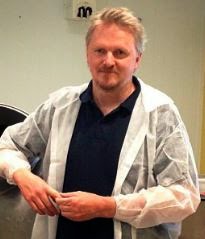The Butter Viking
 |
| Patrik Johansson aka The Butter Viking |
Patrik Johansson has had quite a life.
He managed a coffee plantation in Madagascar, prospected for gold,
lived in New York and Paris and for ten years owned his own IT
company. But for the last six years, he's been living in the Swedish
wilderness and making butter. 'I made more money, but there was no
passion, no romantic thoughts about grass and cows,' said Johansson
over coffee at London restaurant Grain Store where earlier this year
he collaborated on a special menu with head chef Bruno Loubet and
Frank Hederman of Belvelly Smoke House in Cork.
Commercial brands aside, Johansson is
the world's best known butter maker and the 47 year old Swede is
unabashed about the reason for his fame as the Butter Viking. 'I
guess its all thanks to Noma. We were supplying the restaurant just
before they were named number one for the first time. It was amazing,
we went there and had a meeting with Rene, he was the first one to
buy our virgin butter which is quite different to normal butter. He
saw the potential in it whereas a lot of other chefs didn't really
understand.'
 |
| Johansson's butters churned at the Grain Store in London, February 2014 |
Things could have turned out
differently however. 'About four years ago, a Swedish chef told me he
was going to London to work for Gordon Ramsay and I asked him to take
samples of our butter with him. I heard nothing. I tried to call the
Swedish chef but no answer. It was not until one year after that he
told me he didn’t dare to present it to Ramsay because it was so
different.'
So what makes Johansson's virgin butter
('Normal butter we have plastic gloves and we work it with our hands,
this butter is never touched by man so it's kind of virgin and the
name kind of stuck,' says Johansson) so unique?
'My grandma was a butter maker in the
40's 50's and 60's and she taught me how to make butter, but I'm
sorry grandma, I do the opposite to what you might say. I've read 400
scientific papers on the subject and I have been experimenting a lot.
I don’t wash my butter with a lot of water to get rid of the
buttermilk, on the contrary, I want as much of the buttermilk to stay
in the butter. It may not keep as long as her butter did and it's not
suitable for frying meat or baking, its only suitable for the table.
We want maximum flavour, not maximum 'keepability'.'
 |
| Grain Store restaurant, London |
Johansson refuses to reveal the
entirety of his production method but does say that he uses 40 per
cent fat cream that's cultured for three days (instead of the more
usual 8-18 hours) and that a secret temperature curve and precise
timings are crucial to the churning process. 'If I churn five
seconds too long, if I just turn my back its ruined, it turns into
normal butter and buttermilk. I have to constantly watch it.'
The result is an incredibly distinctive
and delicious butter; light and creamy but with a complex flavour and
pronounced but balanced acidity. It makes an ideal partner to
Hederman's superb, subtly beech wood smoked salmon that's served as a
starter at the Grain Store meal. As well butter made from crème
fraiche smoked by Hederman, Johansson served his pièce
de résistance, King's Butter, originally created for a royal
visit to Gothenburg by the King of Sweden.
 |
| Frank Hederman's smoked salmon served with virgin butter at the Grain Store |
'We would never sell it because it
takes ages to make. I came up with this idea of cream cultured for
three days and salted until it sings in your mouth. I melt regular
butter and add it drop by drop on the surface of the cream, wait a
minute or two, fold it down gently, repeat the process 30-40 times
until the cream is saturated with small pearls of butter.'
Passion is a word too easily used in
connection with food, but not when it comes to Johansson. Unable to
compromise on quality, he turned his back on a thousand square metre
production facility when investors suggested he used cheaper cream
and now commutes weekly to the Noma kitchens to make virgin butter on
site.
'I hope to find a place here in London
where I can come two times a month and make some butter. There are
several interesting restaurants here and we have previously supplied
some places,' says Johansson. 'I have to find an investor again I
guess. There might be someone who understands. We make a profit, its
not that much but I feel good. I just love this food business.'


Comments